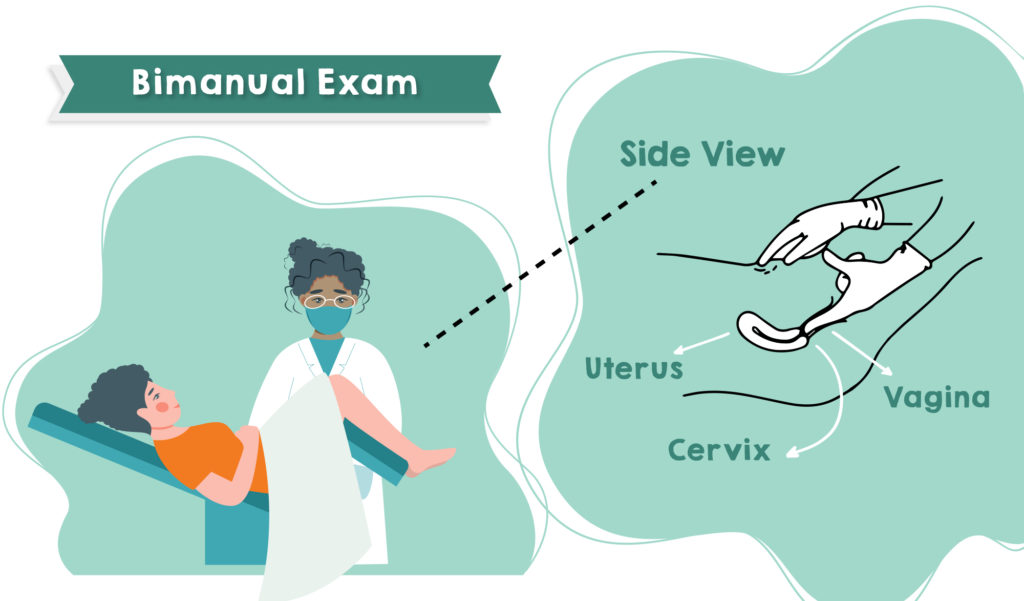Your gynecologist (gyno, for short) is an important partner in your reproductive healthcare. They are the doctor to go to for regular sexual health checks, and anytime you have questions about your period or vaginal health. Feeling nervous about your first gyno appointment? We’ve put together a guide so you can know what to expect.
Your first visit to the Gyno
It’s a good idea to have your first gynecologist appointment between the age of 13-15. This gives the doctor a chance to get to know you, talk to you about your health, and let you know what to expect at future visits. Usually a pelvic exam is not done during the first appointment and may not be necessary for many years.
The gyno will ask some questions, do a general health check, and may do a breast exam. Expect to be asked about your periods and if you are sexually active. The doctor will usually ask your parent or caregiver to wait outside during these personal questions. Doctors are also legally bound to keep your conversations private unless they feel you are in danger. Aside from your first visit, there are several other times when it’s important to make an appointment with your gyno:
When to see a Gyno
- You’re 14 and haven’t noticed any signs of puberty in your body (breast buds developing, pubic hair, etc)
- You’re 15 and haven’t had a period yet
- Your PMS or period pain is unmanageable
- Your period flow is different to what you normally experience (extra heavy, clotting, or period lasts longer than 7 days)
- You have vaginal itching, burning, redness, swelling, unusual odor, abnormal discharge, or you see or feel sores on your genital area
- You are starting to think about becoming sexually active and need to discuss safe sex practices
- You have irregular periods more than 2 years after your first period
- You’ve missed more than two periods
- You are sexually active and have missed your period
- You believe that you’ve been exposed to a sexually transmitted disease
- You’re needing to urinate very frequently, or you feel a burning sensation while urinating
- You’ve injured your pelvic area
- You have any questions whatsoever on your periods, body, what is normal, etc!
What to Expect at your Appointment
Keep in mind that doctors and nurses examine many people each day. They have seen vaginas of all kinds and are not there to judge your body. If you have any specific concerns, your gynecologist may examine your internal and external genital area to see if you are healthy and developing as expected. Your exam will start with a conversation to help the doctor get to know you and how you’re developing. Tell your doctor when you had your first period, the date of your last period, and if you are sexually active. You might also be asked about PMS, period cramps, and whether you’re experiencing any other pains or itching. It is common practice to have your vitals taken, get a breast exam, and have an external exam of the vulva. An internal pelvic exam may be recommended, depending on if you have any concerns or not and sometimes if you’ve been sexually active.
You have the right to choose whether you want to be seen by a male or female doctor or nurse. You also have the right to decline an exam if you feel you’re not ready, but keep in mind, if you have a specific concern, sometimes an exam is needed to figure it out. Your doctor can help you navigate your options and comfort level. They will ask you to put on a hospital gown with the opening of the gown in the front. If you need a pelvic exam, then you will lay on the cushioned table and place your legs in the stirrups (like foot rests). Your gyno should clearly explain each step of the exam.
During your exam, the gyno may:
- Examine the external part of your genitals (called the vulva) and the opening of your vagina.
- Do an internal exam by inserting a speculum into your vagina to open up the vaginal walls. This does not hurt, but it can feel a bit weird and sometimes cold. The speculum allows your gyno to visualize the vagina and cervix. In the US, if you are 21, a pap smear is recommended at this time, where a long q-tip is inserted to swab some cells from your cervix and send them to get tested. A pap test is evaluated for precancerous and cancerous changes of the cervix.
- Perform a bimanual exam, where your gyno puts 2 gloved fingers into your vagina while gently pressing on your lower abdomen with their other hand. The purpose of this exam is to examine the uterus and ovaries. It’s important to remember that if you feel pain or do not want to continue at any point, you can ask to stop.
Do pelvic exams hurt?
A pelvic exam should not be painful, but it can be a bit uncomfortable, especially if you’re tense. With each breath try to focus on relaxing your stomach and leg muscles. This should help ease any discomfort for the few minutes it takes to do the exam.
Talking with your Gyno
It’s important to ask your doctor any questions you have about the changes going on in your body, and share any concerns you might have. These conversations are always kept private unless the medical provider feels there is a safety concern. You might have questions about things like body odor, hair growth, acne, or sweating.
- Let your gyno know if you’re experiencing any PMS symptoms and how you are managing them. Your menstrual cycle and hormones can affect your whole body and mind, so if you’re having issues with PMS, your flow or feeling depressed, low on energy, or having sleep problems, tell your gyno these things too!
- Most importantly, you need to be honest with your doctor if you have been sexually active, or are thinking about beginning sexual activity. That way your doctor can give you information on birth control, and how to prevent sexually transmitted diseases or infections.
- If you have lots of questions, you may need more than one appointment to cover it all, and that’s OK!






